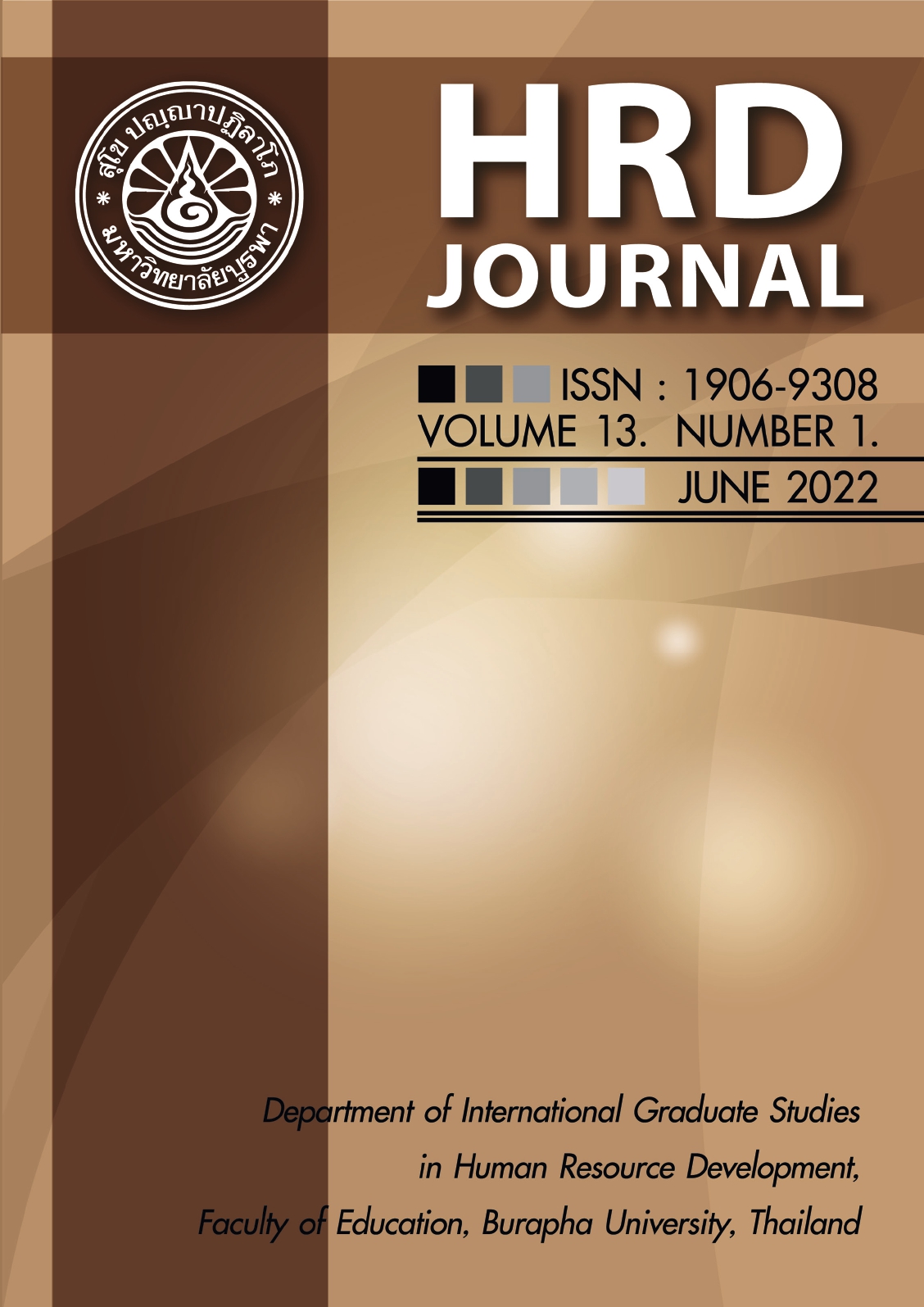An Evaluation of the Master of Arts Program in Human Resource Development (Revised A.D. 2018), Faculty of Education, Burapha University
Keywords:
Curriculum Evaluation, Human Resource Development, UniversityAbstract
The purposes of this study were 1) to evaluate the curriculum of the Master of Arts Program in Human Resource Development (Revised Curriculum, B.E. 2561 (2018)), in the Faculty of Education, Burapha University, and 2) to provide guidelines for development and improvement of the Master of Arts Program in Human Resource Development (Revised Curriculum, B.E. 2561 (2018)), in Faculty of Education, Burapha University. The researcher used CIPPIEST model of Daniel L. Stufflebeam to assess the program. In this study, the mixed method approaches were applied. For quantitative research, questionnaires were used to collect data from stakeholders comprising lecturers, current undergraduate students, alumni, and employers or supervisors of the graduate students. The data were analyzed by descriptive statistics including frequency, percentage, mean, and standard deviation. In qualitative research, in-depth interviews were conducted with the experts, and the data gained from such interviews were analyzed with content analysis.
The results of the research suggested that: 1) based on evaluation result from CIPPIEST Model, it was found that the scores of context evaluation, input evaluation, process evaluation, product evaluation, impact evaluation, effectiveness evaluation, sustainability evaluation, and transportability evaluation were at the highest level in all aspects; 2) regarding guidelines for development and improvement of the program, it was found that the curriculum should encourage the students to be practitioner in line with the fundamental theory, and the lecturers should ensure that the students understand and can apply the knowledge to their practice, and place emphasis on human capital development by providing important HRD knowledge in various aspects, and encourage the students to be HRD influencer and innovator. Regarding suggestions for curriculum improvement, the responsible lectures should consider the correspondence between the philosophy, importance and objectives and courses of the curriculum, and needs of the students and current social context to raise the attractiveness; update the content of the course; improve the process for preparing students before participating in the course; and provide resources and financial support to facilitate the learning of the students.
References
กองแผนงานสำนักงานอธิการบดี มหาวิทยาลัยบูรพา. (2563). แผนยุทธศาสตร์ มหาวิทยาลัยบูรพา ประจำปี
งบประมาณ พ.ศ. 2564-2567 (ฉบับเสนอที่ประชุมสภามหาวิทยาลัย ในคราวประชุมครั้งที่ 8/2563 วัน
อังคารที่ 18 สิงหาคม พ.ศ. 2563). สืบค้นจาก http://www.polsci-law.buu.ac.th/pollaw/ download/news/BUU_Strategic_Plan_2564-2567_(Council.BUU_8-2563).pdf
กัลยา วานิชย์บัญชา. (2557). การวิเคราะห์สมการโครงสร้าง (SEM) ด้วย AMOS. (พิมพ์ครั้งที่ 2). กรุงเทพฯ: ห้าง
หุ้นส่วนจำกัดสามลดา.
คณะกรรมการพัฒนาการเศรษฐกิจและสังคมแห่งชาติ. (2561). ยุทธศาสตร์ชาติ พ.ศ. 2561-2580
(ฉบับประกาศราชกิจจานุเษกษา). สืบค้นจาก http://nscr.nesdb.go.th
ไชยยศ ไพวิทยศิริธรรม และสมาธิ นิลวิเศษ. (2561). การประเมินหลักสูตรศิลปศาสตรมหาบัณฑิต สาขาสนเทศ
ศาสตร์เพื่อการศึกษา บัณฑิตวิทยาลัย มหาวิทยาลัยศิลปากร. Veridian E-Journal, Silpakorn. 11(2),
-1957.
ทีปทัศน์ ชินตาปัญญากุล, สมจิตรา เรืองศรี, กิตติศักดิ์ ลักษณา, และ พรภิรมย์ หลงทรัพย์. (2560). การประเมิน
หลักสูตรแนวใหม่: รูปแบบ CIPPIEST. วารสารพยาบาลตำรวจ, 9(2), 203-212.
นพพร แหยมแสง. (2560). การประเมินหลักสูตรศึกษาศาสตรมหาบัณฑิตสาขาวิชาคณิตศาสตรศึกษา คณะ
ศึกษาศาสตร์ มหาวิทยาลัยรามคำแหง. วารสารวิจัยและพัฒนาวไลยอลงกรณ์ในพระบรมราชูปถัมภ์,
(1), 95-103.
บุญใจ ศรีสถิตนรากูล. (2555). การพัฒนาและตรวจสอบคุณภาพเครื่องมือวิจัย: คุณสมบัติการวัดเชิงจิตวิทยา.
กรุงเทพฯ: โรงพิมพ์แห่งจุฬาลงกรณ์มหาวิทยาลัย.
“ประกาศกระทรวงศึกษาธิการ เรื่อง เกณฑ์มาตรฐานหลักสูตรระดับบัณฑิตศึกษา พ.ศ. 2558” (2558, 13
พฤศจิกายน). ราชกิจจานุเบกษา. เล่ม 132 ตอนพิเศษ 295 ง. หน้า 12-14.
พจนีย์ มั่งคั่ง, กัญภร เอี่ยมพญา, ศิริวัฒน์ จิระเดชประไพ, พรทิพย์ คำชาย, สมศักดิ์ เอี่ยมคงสี, ลินดา นาคโปย,
และอำนาจ บุญประเสริฐ. (2561). การประเมินหลักสูตรครุศาสตรมหาบัณฑิต สาขาวิชาการบริหารการศึกษา (หลักสูตรปรับปรุง ปี พ.ศ. 2559) คณะครุศาสตร์ มหาวิทยาลัยราชภัฏราชนครินทร์. วารสารวิชาการหลักสูตรและการสอน มหาวิทยาลัยราชภัฏสกลนคร. 10(28), 243-255.
มารุต พัฒผล. (2558). การประเมินหลักสูตรเพื่อการเรียนรู้และพัฒนา (พิมพ์ครั้งที่ 3). กรุงเทพฯ: จรัลสนิทวงศ์
การพิมพ์.
มาเรียม นิลพันธ์. (2011). การประเมินหลักสูตรปรัชญาดุษฎีบัณฑิต สาขาวิชาหลักสูตรและการสอน คณะ
ศึกษาศาสตร์ มหาวิทยาลัยศิลปากร. Veridian E-Journal, Silpakorn. 4(2), 248-262.
รุ่งทิวา จันทร์วัฒนวงษ์. (2557). เอกสารประกอบการสอนรายวิชาการพัฒนาหลักสูตร. อุดรธานี: คณะครุศาสตร์
มหาวิทยาลัยราชภัฎอุดรธานี.
ลัดดาวัลย์ เพชรโรจน์. (2557). การประเมินหลักสูตรศึกษาศาสตรมหาบัณฑิต สาขาวิชาการบริหารการศึกษา
มหาวิทยาลัยราชพฤกษ์. รายงานการวิจัย มหาวิทยาลัยราชพฤกษ์.
วสันต์ ทองไทย. (ม.ป.ป.). การประเมินหลักสูตรจากทฤษฎีสู่การปฏิบัติ. สืบค้นจาก
http://www.doed.edu.ku.ac.th/article/eva_curri.pdf เมื่อวันที่ 27 ตุลาคม พ.ศ. 2563.
สมพร ร่วมสุข, มณฑนา วัฒนถนอม, บุษบา บัวสมบูรณ์, อธิกมาส มากจุ้ย, บำรุง ชำนาญเรือ, และชลธิชา หอม
ฟุ้ง. (2559). การประเมินหลักสูตรศึกษาศาสตรมหาบัณฑิต สาขาวิชาการสอนภาษาไทย คณะ
ศึกษาศาสตร์ มหาวิทยาลัยศิลปากร. Veridian E-Journal, Silpakorn University. 9(1), 1117-1128.
อัจฉรียา นันทศิริพล และสินชัย เล็กวานิชกุล. (2562). การปรับตัวของหลักสูตรต่อกระแสแนวโน้มการล่มสลาย
ของอุดมศึกษา. วารสารวิชาการสถาบันเทคโนโลยีแห่งสุวรรณภูมิ สาขามนุษยศาสตร์และสังคมศาสตร์.
(2), 663-673.
Downloads
Published
How to Cite
Issue
Section
License
Copyright (c) 2022 Department of International Graduate Studies in Human Resource Development, Faculty of Education, Burapha University

This work is licensed under a Creative Commons Attribution-NonCommercial-NoDerivatives 4.0 International License.
Copyright@HRD Journal, Burapha University






